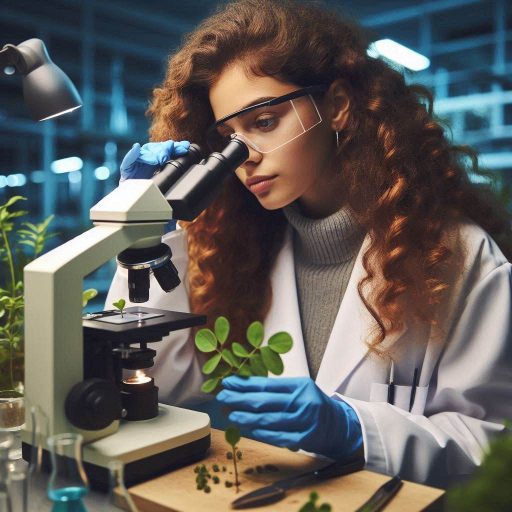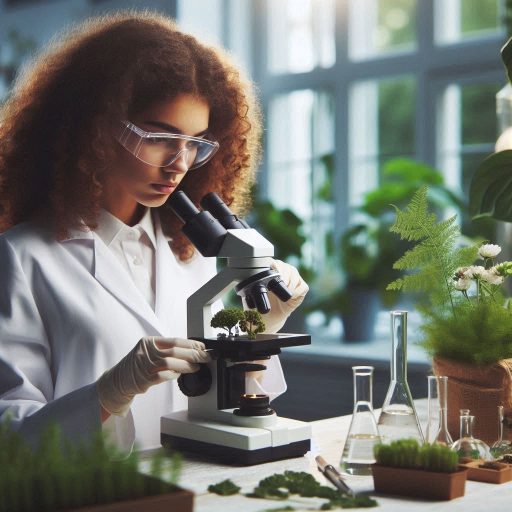Introduction
Botany, the study of plants, plays a crucial role in scientific research.
It helps us understand plant life and their interactions with the environment.
Scope of botany research includes plant anatomy, physiology, ecology, genetics, and taxonomy.
These specialized areas contribute to agricultural innovations, medical advancements, and environmental conservation.
Plant anatomy research focuses on studying the structure and organization of plant tissues.
This field helps us understand how plants grow, develop, and adapt to different environments.
Physiology research explores plant functions such as photosynthesis, respiration, and nutrient uptake.
Understanding these processes can lead to improvements in crop yield, disease resistance, and environmental sustainability.
Ecology research studies the interactions between plants and their surroundings.
This area is crucial for managing ecosystems, conserving biodiversity, and addressing climate change impact on plant life.
Genetics research delves into plant genetics, DNA sequencing, and genetic engineering.
This field is instrumental in developing genetically modified crops, plant breeding programs, and disease-resistant varieties.
Taxonomy research involves classifying and identifying plant species.
This helps in documenting plant diversity, conservation efforts, and understanding evolutionary relationships among different plant groups.
Overall, botany research is essential for sustainable agriculture, pharmaceutical development, biofuel production, and ecosystem preservation.
Its interdisciplinary nature makes it a vital field in addressing global challenges related to food security, health, and environmental sustainability.
Specializations in Botany Research
Overview of different specializations within the field of botany
Botany, the scientific study of plants, encompasses a wide range of specializations that focus on different aspects of plant life.
These specializations are essential for in-depth research and understanding of the diverse world of plants.
Plant Physiology
Plant physiology is the study of how plants function at the cellular and molecular levels.
It involves understanding processes such as photosynthesis, respiration, and reproduction in plants.
Researchers in this specialization explore how plants respond to environmental factors and stress, as well as how they adapt to different conditions.
Taxonomy
Taxonomy is the science of classifying and categorizing plants based on their characteristics and evolutionary relationships.
Taxonomists identify and name plant species, making it easier to study and conserve plant diversity.
This specialization is crucial for understanding the evolutionary history of plants and their relationships with other organisms.
Ecology
Ecology focuses on the interactions between plants and their environment.
Ecologists study how plants interact with other organisms, their role in ecosystems, and the impact of human activities on plant communities.
This specialization is vital for conservation efforts and understanding the effects of climate change on plant populations.
Detailed explanation of each specialization
Plant Physiology
Plant physiology research delves into the internal processes of plants, such as how they transport nutrients, regulate growth, and respond to stimuli like light and temperature.
Researchers in this field may investigate the mechanisms behind plant diseases, develop strategies for crop improvement, or study the biochemistry of plant metabolites.
Taxonomy
Taxonomy specialists use morphological, genetic, and biochemical data to classify plants into groups based on shared characteristics.
They also work to identify new plant species, resolve taxonomic uncertainties, and revise existing classification systems.
Taxonomists play a critical role in biodiversity conservation and provide a foundation for botanical research and education.
Ecology
Ecologists study the relationships between plants and their biotic and abiotic environment.
They may focus on topics such as plant-animal interactions, nutrient cycling, plant community dynamics, or the effects of pollution on plant health.
Ecological research helps us understand the complex web of interactions that sustain plant populations and ecosystems.
The importance of specialization in botany research
Specialization in botany research is essential for gaining a deep understanding of plants and addressing complex scientific questions.
By focusing on specific areas within the field, researchers can develop expertise, advance knowledge, and contribute valuable insights to the broader scientific community.
In plant physiology, specialization allows researchers to unravel the intricate physiological processes that govern plant growth, development, and responses to environmental cues.
This knowledge is fundamental for improving crop yields, developing sustainable agricultural practices, and addressing global food security challenges.
Taxonomy specialization is crucial for accurately classifying and naming plant species, which provides a framework for studying plant diversity, evolution, and distribution.
Taxonomists play a key role in biodiversity conservation, species conservation efforts, and the discovery of potentially useful plants for medicine, agriculture, and other applications.
Ecology specializations are vital for understanding how plants interact with other organisms and their environment.
This knowledge is essential for conservation biology, restoration ecology, and ecosystem management.
Ecologists provide insights into the effects of human activities on plant communities and work towards sustainable solutions to environmental challenges.
Basically, specialization in botany research is indispensable for advancing our knowledge of plants and addressing pressing global issues.
By delving deep into plant physiology, taxonomy, and ecology, researchers can uncover the mysteries of the plant world and contribute valuable insights to scientific progress and conservation efforts.
Read: Essential Skills and Tools for Modern Chemists in America
Focus Areas in Botany Research
Current Trends and Focus Areas in Botany Research
Botany research continues to evolve, driven by current trends and emerging challenges.
Researchers today focus on several key areas that shape our understanding of plant life.
These focus areas include plant ecology, conservation biology, and plant biotechnology.
Each specialization plays a crucial role in addressing global issues such as climate change and food security.
One prominent trend is the study of plant responses to environmental changes.
Scientists investigate how plants adapt to climate change.
They explore physiological and genetic mechanisms that allow plants to thrive in challenging conditions.
This research not only informs conservation efforts but also aids in developing resilient crops.
Another vital area is the conservation of plant biodiversity.
Researchers strive to understand the factors contributing to plant extinction.
They examine ecosystems that support diverse plant species and identify key threats.
By focusing on conservation, scientists help protect vital resources for future generations.
The Importance of Identifying Specific Research Areas for Specialization
Identifying specific research areas for specialization is essential in botany.
Specialization allows researchers to dive deeper into their chosen field.
This depth of knowledge leads to innovative solutions to pressing challenges.
By concentrating on a niche area, scientists can become experts, pushing the boundaries of what we know about plants.
The Impact of Advancements in Technology on Botany Research Focus Areas
Technology significantly impacts botany research focus areas.
Advances in genomics and bioinformatics enhance our understanding of plant genetics.
Researchers can analyze large datasets to uncover genetic variations.
This information aids in breeding programs and conservation strategies.
Furthermore, remote sensing technologies enable scientists to monitor ecosystems effectively.
They can assess plant health and biodiversity from a distance, leading to more efficient conservation efforts.
Moreover, the integration of artificial intelligence (AI) in botany research is transforming the field.
AI algorithms can analyze plant traits and predict responses to environmental changes.
This technology accelerates the discovery of new plant varieties and cultivars.
Researchers harness AI to enhance decision-making in conservation and agriculture.
Generally, current trends in botany research highlight the importance of specific focus areas.
Specialization enables researchers to address critical challenges in plant science.
Technological advancements further enhance our understanding and capabilities in this field.
By investing in these focus areas, we pave the way for a sustainable future where plants thrive amidst changing environmental conditions.
Read: The Role of Chemists in US Environmental and Sustainability Efforts

Contribution of Botany Research to Society
How botany research contributes to environmental sustainability
Botany research plays a crucial role in enhancing environmental sustainability.
Scientists study plant species to understand their roles in ecosystems.
They analyze how plants interact with their environments, which helps in biodiversity conservation.
This research leads to the development of sustainable agricultural practices.
By promoting plant health, researchers help maintain ecosystem balance, benefiting both nature and society.
The role of botanists in addressing global challenges such as food security and climate change
Botanists address significant global challenges, including food security.
They explore ways to improve crop yields through genetic modification and traditional breeding techniques.
This research helps create more resilient crops that can withstand pests, diseases, and climate extremes.
As the global population continues to rise, ensuring sufficient food supply is critical.
Botanists‘ contributions to crop science directly impact communities and economies worldwide.
Climate change poses another major challenge, and botanists play a vital role in combating its effects.
They study plant responses to changing climates and develop strategies for adaptation.
For instance, researchers identify drought-resistant plant varieties to help farmers cope with reduced water availability.
By understanding how plants adapt, botanists can suggest practices that mitigate climate impacts on agriculture and natural ecosystems.
Examples of successful botany research projects with significant societal impacts
Numerous successful botany research projects demonstrate significant societal impacts.
One notable example is the Green Revolution.
This initiative involved scientists developing high-yielding crop varieties, which transformed agriculture in developing countries.
The introduction of these crops led to substantial increases in food production.
Consequently, millions of people escaped poverty and hunger.
Another impactful project involves the restoration of native plant species.
In many regions, invasive species threaten local flora and fauna.
Botanists conduct research to identify and propagate native plants that can restore degraded ecosystems.
Their efforts contribute to biodiversity conservation and habitat restoration.
This work not only benefits wildlife but also enhances local communities‘ quality of life.
Botany research also aids in combating diseases.
For example, scientists study medicinal plants to discover new drugs and treatments.
These discoveries can lead to breakthroughs in healthcare, providing alternative therapies for various ailments.
By promoting public health through plant research, botanists make invaluable contributions to society.
Most importantly, botany research significantly contributes to environmental sustainability, food security, and climate change mitigation.
Botanists’ work leads to successful projects that positively impact society.
Their dedication to understanding plant science enhances our world, making it more resilient and sustainable for future generations.
Through their research, botanists continue to play a vital role in addressing global challenges.
Read: Day in the Life: An Environmental Scientist‘s Typical Day
Challenges in Botany Research
Challenges faced by botanists in their research work
Botany research faces several significant challenges that hinder scientific progress.
Understanding these obstacles helps identify effective strategies for overcoming them.
Transform Your Career Today
Unlock a personalized career strategy that drives real results. Get tailored advice and a roadmap designed just for you.
Start NowFunding constraints, limited resources, and technological barriers
One primary challenge is funding constraints.
Many botanical research projects rely on grants from government agencies and private institutions.
However, competition for funding is fierce.
Many researchers submit proposals, but only a small percentage receive support.
Insufficient funding limits the scope and scale of research initiatives.
Consequently, many promising studies go unfunded.
Limited resources also pose a significant barrier.
Botanists often struggle with inadequate laboratory equipment and field supplies.
Without proper tools, conducting experiments and collecting samples becomes difficult.
This lack of resources can compromise the quality of research findings.
Furthermore, some institutions may not have access to essential databases and publications.
These gaps hinder researchers from staying up-to-date with the latest scientific developments.
Technological barriers further complicate botany research.
Rapid advancements in technology create challenges for botanists who may lack the necessary training.
Many researchers struggle to keep up with sophisticated techniques in molecular biology and bioinformatics.
As a result, they miss opportunities to employ cutting-edge methods in their studies.
This can limit the potential impact of their research.
Strategies to overcome these challenges and improve the quality of botany research
Overcoming these challenges requires a multi-faceted approach.
First, fostering collaboration among researchers can lead to shared resources and knowledge.
Collaborative efforts allow scientists to pool funding and equipment, thus maximizing research potential.
By forming partnerships, botanists can tackle larger projects that individual researchers might find overwhelming.
Second, advocating for increased funding is crucial.
Researchers can engage with policymakers to highlight the importance of botanical research.
By communicating the societal benefits of studying plants, such as food security and climate change mitigation, they can attract more funding.
Public outreach campaigns can raise awareness and garner support for funding initiatives.
Third, investing in training and development programs is essential.
Institutions should provide workshops and resources to help researchers adapt to new technologies.
By enhancing their skills, botanists can effectively incorporate advanced techniques into their research.
Finally, researchers should utilize open-source software and online platforms.
These tools often provide cost-effective solutions for data analysis and collaboration.
By leveraging these resources, botanists can enhance their research capabilities without incurring significant costs.
In short, challenges in botany research include funding constraints, limited resources, and technological barriers.
However, by fostering collaboration, advocating for funding, investing in training, and utilizing online tools, researchers can overcome these obstacles.
By addressing these challenges, the quality and impact of botany research can improve significantly.
Read: The Impact of Technology on the Chemist Profession in the US
Future Directions in Botany Research
Future trends and developments in the field of botany research
As technology continues to advance, the future of botany research is filled with exciting possibilities.
One key trend that is expected to shape the field is the increased use of genomics and bioinformatics.
Scientists are already utilizing these tools to better understand plant genetics, evolution, and adaptation.
Another important development to watch out for is the integration of artificial intelligence and machine learning in plant biology research.
These technologies have the potential to revolutionize the way we study plant processes, from photosynthesis to disease resistance.
Moreover, with the growing concern over climate change and food security, there will be a greater focus on studying plant responses to environmental stressors.
This includes exploring how plants can be engineered to be more resilient to drought, heat, and pests.
In addition, the rise of synthetic biology is expected to open up new avenues for creating designer plants with specific traits for agricultural, pharmaceutical, and industrial applications.
This interdisciplinary approach will lead to innovative solutions for crop improvement and sustainable farming practices.
Overall, the future of botany research is likely to be characterized by cutting-edge technologies, interdisciplinary collaborations, and a greater emphasis on addressing global challenges related to plant biology.
Potential areas for growth and innovation within botany research
One area that holds great promise for growth in botany research is the field of plant-microbe interactions.
Understanding how plants interact with beneficial and harmful microbes can lead to novel strategies for enhancing crop productivity and environmental sustainability.
Another promising area for innovation is the study of plant secondary metabolites.
These compounds play crucial roles in plant defense mechanisms, but they also have potential applications in medicine, cosmetics, and other industries.
Unlocking the biosynthetic pathways of these compounds could lead to the development of new drugs and products.
Furthermore, the exploration of plant phenomics is an emerging field that offers new opportunities for advancing botany research.
High-throughput imaging and data analysis techniques can provide insights into plant growth, development, and responses to the environment at unprecedented scales.
Additionally, the integration of computational modeling and simulation in plant biology research is expected to accelerate our understanding of complex biological systems.
These tools can help predict how plants will respond to different conditions and guide experimental design for more efficient research outcomes.
In fact, there are several areas within botany research that hold great potential for growth and innovation.
Including plant-microbe interactions, secondary metabolites, phenomics, and computational modeling.
The importance of interdisciplinary collaborations in shaping the future of botany research
Interdisciplinary collaborations are crucial for advancing botany research and addressing complex scientific challenges.
By bringing together experts from different fields such as biology, chemistry, physics, engineering, and computer science, researchers can combine their diverse expertise to tackle problems in innovative ways.
For example, a biologist working on plant genetics may collaborate with a computer scientist to develop algorithms for analyzing genomic data.
This synergy of knowledge and skills can lead to breakthroughs in understanding the genetic basis of plant traits and diseases.
Moreover, interdisciplinary collaborations can help bridge the gap between basic research and practical applications.
By working with experts in agriculture, biotechnology, and environmental science, botanists can translate their scientific findings into solutions that benefit society, such as developing new crop varieties or improving ecosystem conservation strategies.
Additionally, interdisciplinary collaborations foster creativity and innovation by encouraging researchers to think outside their traditional disciplines.
This cross-pollination of ideas can spark new research directions and inspire groundbreaking discoveries that would not have been possible otherwise.
In a nutshell, interdisciplinary collaborations are essential for shaping the future of botany research by fostering scientific innovation, driving practical applications, and pushing the boundaries of knowledge in plant biology.
You Might Also Like: Soil Science and Environmental Policy Making
Conclusion
In this blog post, we explored various botany research areas and their specializations.
Botany, the study of plants, plays a vital role in our ecosystem.
Researchers focus on diverse areas such as plant physiology, ecology, and genetics.
Each specialization contributes uniquely to our understanding of plant life.
We discussed how plant physiology examines plant functions and processes.
This research helps scientists understand photosynthesis, respiration, and growth.
Insights gained from plant physiology advance agricultural practices and improve crop yields.
Similarly, ecology studies the interactions between plants and their environments.
This field highlights the importance of biodiversity and ecosystem health.
Genetics research focuses on plant breeding and genetic modification.
Scientists develop new plant varieties that resist diseases and adapt to climate change.
This innovation addresses food security and sustainable agriculture challenges.
Additionally, ethnobotany explores the relationship between people and plants.
This area emphasizes the cultural significance of plants and their uses in traditional medicine.
Overall, these specializations illustrate the breadth of botany research.
Each area offers insights that contribute to environmental sustainability and agricultural advancement.
The collective knowledge from these fields is essential for addressing global challenges.
Understanding plant biology helps us manage resources and protect ecosystems effectively.
The importance of botany research cannot be overstated.
Plants are vital for life on Earth, providing food, oxygen, and habitat.
As climate change impacts ecosystems, research becomes crucial for developing adaptive strategies.
By studying plants, scientists can identify solutions to pressing environmental issues.
These solutions not only benefit ecosystems but also enhance human well-being.
[E-Books for Sale]
The Big Book of 500 High-Paying Jobs in America: Unlock Your Earning Potential
$19.99 • 500 High-Paying Jobs • 330 pages
Explore 500 high-paying jobs in America and learn how to boost your career, earn more, and achieve success!
See All 500 High-Paying Jobs of this E-Book
1001 Professions Without a Degree: High-Paying American Jobs You Can Start Now
$19.99 • 1001 Professions Without a Degree • 174 pages
Discover 1001 high-paying jobs without a degree! Unlock career tips, skills, and success strategies for just $19.99!




